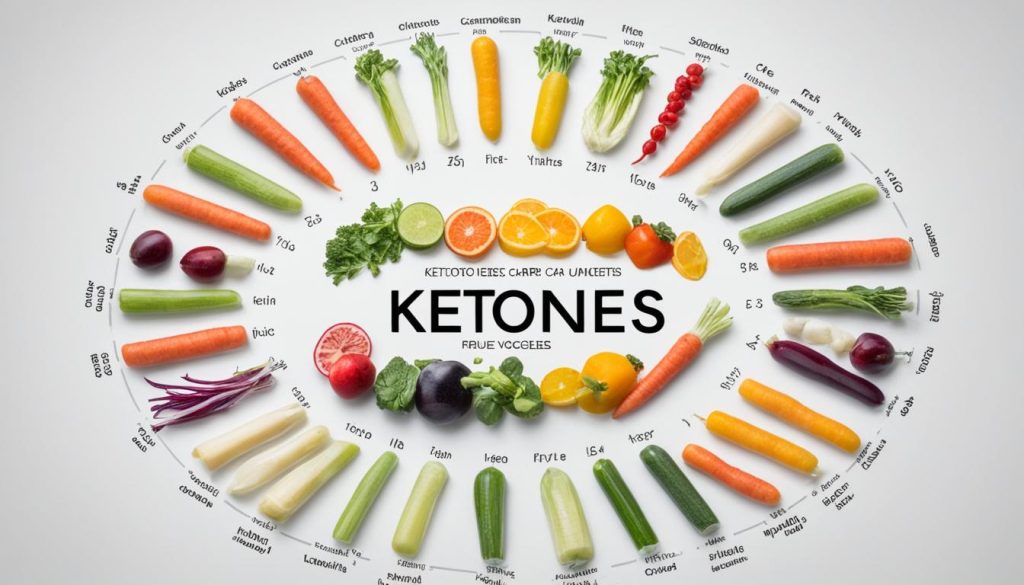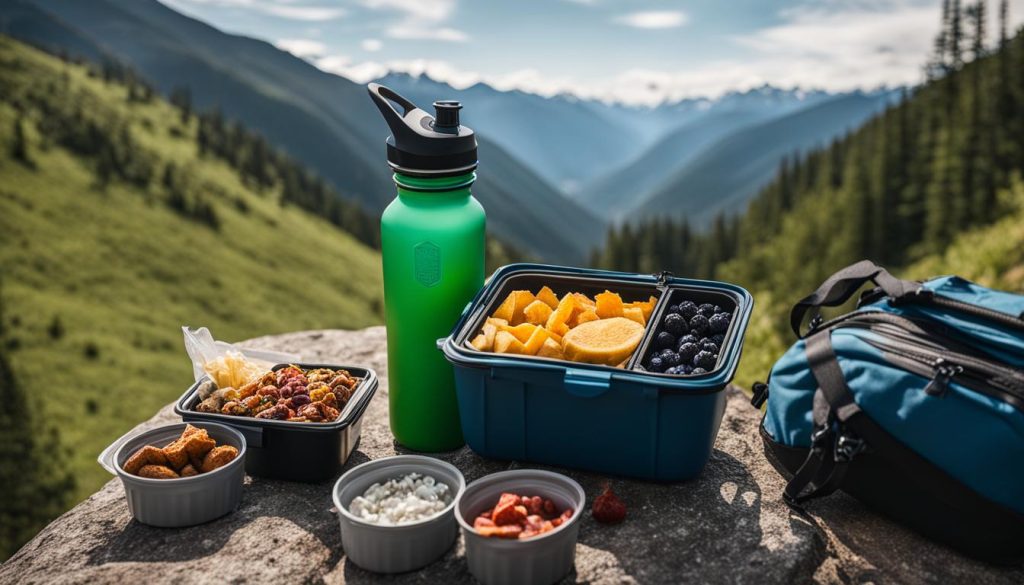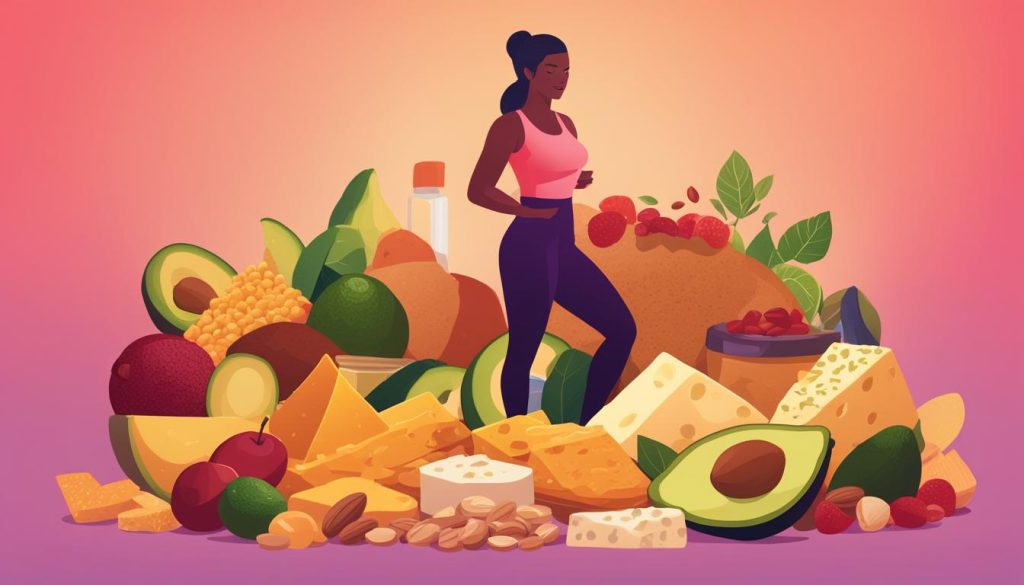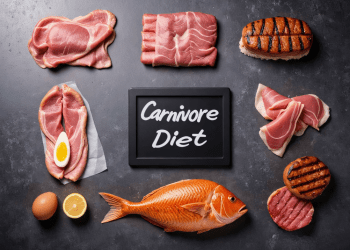Are you curious about how long it takes to enter ketosis? The timeline for achieving ketosis can vary from person to person, but generally, it can take 2-4 days if you eat fewer than 50 grams of carbs per day. However, some individuals may take longer, up to a week or more, especially if they consume a high-carb diet before starting keto.
The goal of entering ketosis is to reduce carbohydrate intake, moderate protein consumption, and increase calories from fat in order to switch the body’s fuel source from glucose to ketones. For some individuals, depleting glycogen stores is necessary before entering ketosis. It is important to note that entering ketosis is an individualized process influenced by factors like physical activity level, age, metabolism, and carbohydrate, fat, and protein intake.
Key Takeaways:
- The time it takes to enter ketosis can vary from person to person.
- On average, it can take 2-4 days with a low carb diet.
- Individuals consuming a high-carb diet may take longer to enter ketosis.
- Factors like age, metabolism, and activity level can influence ketosis duration.
- Entering ketosis requires reducing carbohydrate intake and increasing fat consumption.
What is Ketosis and Its Benefits
In the world of nutrition and weight loss, you may have come across the term “ketosis” or “ketogenic diets.” But what exactly is ketosis, and how can it benefit your body? Let’s dive into the science behind it and explore the advantages of this metabolic state.
Ketosis is a metabolic state in which the body switches its primary fuel source from glucose to ketones. Glucose, derived from carbohydrates, is the body’s preferred fuel. However, with a low carb diet, the body has limited access to glucose, forcing it to find an alternative fuel source.
When you restrict carbohydrate intake and moderate protein consumption, your body starts breaking down stored fat to produce ketones. These ketone bodies, including acetoacetate, acetone, and beta-hydroxybutyrate, become the fuel source in ketosis.
The transition to ketosis has numerous benefits. Let’s take a look at some of the advantages:
- Weight Loss: Ketosis has been shown to facilitate weight loss by promoting the use of stored fat as fuel. By restricting carbohydrate intake and increasing fat consumption, your body becomes more efficient at burning fat, leading to a reduction in body weight.
- Improved Metabolic Function: A ketogenic diet can have a positive impact on metabolic health. It has been associated with improved insulin sensitivity, reduced blood sugar levels, and lower triglyceride levels. These improvements contribute to better overall metabolic function.
- Increase in HDL Cholesterol: High-density lipoprotein (HDL) cholesterol is often referred to as “good” cholesterol. Ketogenic diets have been shown to increase levels of HDL cholesterol, which is associated with a lower risk of heart disease.
- Reduced Blood Sugar and Insulin Levels: By restricting carbohydrate intake, ketosis helps stabilize blood sugar levels and reduces the need for insulin. This can be particularly beneficial for individuals with diabetes or those at risk of developing the condition.
To achieve ketosis, it is essential to limit carbohydrate intake and prioritize fat consumption. This can be done by following a low carb diet and focusing on nutrient-dense foods that are high in healthy fats. By depleting glycogen stores and transitioning to ketone bodies as the primary fuel source, you can experience the numerous benefits of ketosis.
How to Determine When You Enter Ketosis
There are several ways to determine if you’re in ketosis. One method is using a blood ketone meter to measure the levels of ketones in your blood. This glucometer-like device provides a fairly accurate reading of your blood ketone range, indicating whether you’re in a state of ketosis. A range of 0.5-3.0 mmol per liter is considered ideal for maintaining ketosis.
Another method is using urine testing strips, which are easily available over-the-counter. These strips measure the levels of acetoacetate, a ketone body, in your urine. While these strips can provide a rough estimate of your ketone levels, they are not as accurate as blood testing.
Ketone breath meters, such as Ketonix, offer an alternative way to measure your ketone levels. These devices measure the acetone levels in your breath, which is another ketone body produced during ketosis. Just blow into the device to get a reading of your ketone levels. It’s important to note that individual results may vary with breath meter measurements.
Certain symptoms can also indicate that you’re in ketosis, such as increased thirst and a specific fruity breath odor. However, these symptoms alone are not definitive proof of ketosis and should be considered alongside more accurate ketone measuring methods.

To summarize, determining when you enter ketosis can be done through blood ketone meters, urine testing strips, ketone breath meters, and paying attention to specific symptoms. While each method has its own pros and cons, they can provide valuable insights into your body’s metabolic state and whether you’re effectively using ketones as a fuel source.
Factors That Influence Ketosis Duration
When it comes to entering ketosis, the duration can vary from person to person. Several factors play a role in determining how quickly you can achieve ketosis and the timeline for entering this metabolic state.
Individual Differences: Age, metabolism, and activity level can all impact the time it takes to enter ketosis. Younger individuals with a faster metabolism and higher levels of physical activity may achieve ketosis more quickly than older individuals with a slower metabolism and sedentary lifestyle.
Dietary Factors: Your carbohydrate, fat, and protein intake can also influence how long it takes to enter ketosis. Individuals who consume a high-carb diet before starting keto may take longer to enter ketosis as their body needs to deplete glycogen stores before switching to ketone production.
It is important to note that the timeline for entering ketosis is not set in stone and can vary from person to person. It’s crucial to listen to your body and make necessary adjustments to your diet and lifestyle to optimize your chances of entering and maintaining ketosis.
| Factors | Influence on Ketosis Duration |
|---|---|
| Age | Younger individuals may achieve ketosis more quickly than older individuals. |
| Metabolism | A faster metabolism can accelerate the transition into ketosis. |
| Activity Level | Regular physical activity can promote faster entry into ketosis. |
| Carbohydrate Intake | A high-carb diet before starting keto may prolong the time it takes to enter ketosis as glycogen stores need to be depleted. |
| Fat Intake | Increase in fat consumption can facilitate the switch to using ketones as fuel. |
| Protein Intake | Moderate protein consumption is recommended to avoid inhibiting ketone production. |
Potential Challenges in Achieving Ketosis
Achieving ketosis can present certain challenges for some individuals. It’s important to address these obstacles to optimize your chances of entering ketosis quickly and effectively. Some potential challenges include:
- Unintentionally consuming more carbs than recommended for a ketogenic diet can hinder ketosis. It’s crucial to carefully plan your meals and be mindful of your carbohydrate intake. Tracking your carb intake using a food diary or a carb tracking app can help you stay on track.
- Not eating enough fat is another challenge that can delay ketosis. A ketogenic diet requires a significant increase in fat consumption to provide your body with the necessary fuel for ketone production. Be sure to include ample healthy fats in your meals, such as avocados, nuts and seeds, olive oil, and coconut oil.
- Living a sedentary lifestyle can also affect the timeframe to achieve ketosis. Regular physical activity can help accelerate the depletion of glycogen stores and encourage the switch to ketone production. Incorporate exercise into your routine, such as brisk walking, cycling, or weightlifting, to support the ketosis induction process.
- Difficulty getting enough sleep can be a challenge in achieving ketosis. Inadequate sleep can disrupt hormonal balance and impact metabolism, potentially hindering ketone production. Prioritize quality sleep by establishing a consistent sleep schedule, creating a sleep-friendly environment, and practicing relaxation techniques before bed.
- Individuals with certain medical conditions like diabetes or liver disorders should consult with their healthcare provider before attempting a ketogenic diet. These conditions may require specific dietary modifications or monitoring to ensure safety during the ketosis induction process.
By addressing these potential challenges and making necessary adjustments, you can enhance your ability to achieve and maintain ketosis more effectively. It’s important to remember that ketosis is an individualized process, and it may take time and effort to find the optimal approach that works for you.

Considerations Before Trying the Keto Diet
Before embarking on the keto diet, it is crucial to be aware of the potential risks and downsides associated with it. While this diet may initially lead to rapid weight loss, it is important to understand that a portion of this weight loss may be attributed to water loss rather than fat loss. Moreover, the long-term effects of the keto diet on overall health are still relatively unknown.
Some possible complications of the keto diet include the buildup of fat in the liver, the formation of kidney stones, inadequate protein levels, and vitamin deficiencies. Additionally, the keto diet is highly restrictive and may pose challenges for individuals when it comes to sustaining the diet in the long run.
It is strongly recommended to consult with a healthcare professional before making any significant changes to your diet, especially if you have certain medical conditions or are taking medications. A healthcare professional can provide personalized guidance and help you determine if the keto diet is suitable for your individual needs and circumstances.
Being fully informed and seeking professional advice will ensure that you make well-rounded decisions about your health and dietary choices.
Tips to Achieve Ketosis
If you’re struggling to achieve ketosis, I have some tips that can help you get there faster. Follow these strategies to optimize your chances of entering and maintaining ketosis:
- Eat 20-50 grams of carbs per day: Keep your carbohydrate intake within this range to promote ketone production and minimize glucose utilization.
- Track your carb intake: Use a food tracking app or journal to monitor your daily carbohydrate consumption and make necessary adjustments to stay within your desired range.
- Limit dining out at restaurants: Restaurant meals can sometimes be high in hidden carbohydrates. Prepare your own meals at home to have better control over your ingredients.
- Be aware of hidden carb sources: Be mindful of foods that may contain hidden carbohydrates, such as sauces, dressings, and processed snacks. Check nutrition labels and choose low-carb alternatives whenever possible.
- Increase your consumption of high-quality fats: Make sure to include healthy sources of fats in your diet, such as avocados, nuts, seeds, olive oil, and fatty fish. These fats will not only provide energy but also support ketone production.
- Consider intermittent fasting: Intermittent fasting can help accelerate the onset of ketosis by extending the period of time your body relies on stored energy. Experiment with different fasting protocols to find one that suits you.
- Increase physical activity: Engage in regular exercise to deplete glycogen stores and stimulate ketone production. Incorporate both cardiovascular and strength training exercises for optimal results.
- Regularly check your ketone levels: Use blood ketone meters or breath ketone meters to monitor your ketone levels and ensure you’re in a state of ketosis. This can help you gauge the effectiveness of your dietary and lifestyle practices.
By implementing these tips into your routine, you can expedite your journey into ketosis and enhance your chances of maintaining this metabolic state. Remember, consistency is key, and individual responses may vary. Listen to your body, make necessary adjustments, and seek guidance from a healthcare professional if needed.

Importance of Low Carb Intake for Ketosis
One of the key components in achieving and maintaining ketosis is a low carbohydrate intake. Carbs are broken down into sugar molecules, such as glucose, in the digestive tract and used for energy. By restricting carbohydrate intake to under 50 grams per day, the body is forced to deplete its glycogen stores and transition to using ketones as fuel. This shift from glucose to ketones as the primary fuel source is essential for entering and sustaining ketosis.
A low carb diet focuses on reducing or eliminating foods that are high in carbohydrates, such as bread, rice, pasta, and sugary snacks. Instead, it emphasizes foods that are high in protein and healthy fats. By reducing carbohydrate intake, the body is forced to utilize stored fat for energy, leading to weight loss and the production of ketones.
The Benefits of a Low Carb Diet for Ketosis
1. Increased Fat Burning: By restricting carbohydrates, the body switches from burning glucose to burning fat as its primary fuel source. This can result in increased fat burning and weight loss.
2. Stable Blood Sugar Levels: A low carb diet can help regulate blood sugar levels by reducing the intake of foods that cause spikes in blood sugar, such as refined sugars and carbohydrates.
3. Improved Insulin Sensitivity: Carbohydrates can have a significant impact on insulin levels. By reducing carbohydrate intake, individuals may experience improved insulin sensitivity, which can have positive effects on overall health and weight management.
4. Reduced Hunger and Cravings: A low carb diet can help suppress hunger and reduce cravings for sugary and processed foods, making it easier to adhere to a healthy eating plan.
Incorporating a low carb diet into your lifestyle can be a highly effective way to achieve and maintain ketosis. By focusing on reducing carbohydrate intake and increasing healthy fats, you can optimize your body’s ability to utilize ketones as a fuel source, leading to the many benefits associated with ketosis.
The Role of Fats in Ketosis
In a ketogenic diet, fats play a significant role as they become the primary source of calories and energy. By increasing fat consumption and reducing carbohydrate intake, the body is encouraged to switch from using glucose to burning fat for fuel. This transition allows the production of ketones, which serve as an alternative fuel source.
Choosing high-quality fats is essential to support ketosis and overall health. Some examples of healthy fats include:
- Nuts
- Avocados
- Fatty fish
- Healthy oils
By incorporating these fats into your diet, you can optimize your body’s ability to enter and maintain ketosis while providing essential nutrients for overall well-being.

External Resources on Ketosis and the Ketogenic Diet
For those looking to expand their knowledge on ketosis and the ketogenic diet, the following external resources provide credible and comprehensive information. These sources are not in direct competition with this article and offer additional scientific and medical insights into the ketogenic lifestyle.
- National Institutes of Health (NIH):
The NIH, a part of the U.S. Department of Health and Human Services, is the nation’s medical research agency. It offers in-depth research and findings on various health topics, including the science behind ketosis.
Visit NIH for more information - Harvard Health Publishing – Harvard Medical School:
As the publishing arm of Harvard Medical School, it provides access to a wealth of health-related information, including articles on the ketogenic diet and its health implications.
Read more at Harvard Health Publishing - Mayo Clinic:
Renowned for its medical expertise, the Mayo Clinic offers detailed insights on numerous health topics, including the effects and considerations of the ketogenic diet.
Explore ketogenic diet resources at Mayo Clinic
Final Thoughts
Entering ketosis is a highly individualized process that can vary in duration from person to person. While it typically takes 2-4 days to achieve ketosis with a low-carb diet, some individuals may take longer depending on their starting diet, metabolism, and activity level. It is important to understand that the journey to ketosis requires careful planning and personalized efforts.
To enter and maintain ketosis, it is crucial to monitor carbohydrate intake and reduce it to a level that promotes the production of ketones. Increasing fat consumption is also key as it provides the necessary fuel for the body to switch from glucose to ketones. Incorporating physical activity and adjusting as needed based on individual responses is essential for optimizing ketosis.
Remember, achieving ketosis is not a one-size-fits-all process. Each person’s body has unique characteristics, and it is important to listen to your body and make necessary adjustments to meet your individual needs. By staying committed to your goals and making informed choices, you can successfully achieve and maintain ketosis for improved health and well-being.
FAQ
How long does it take to enter ketosis?
The time it takes to enter ketosis can vary from person to person, but generally, it can take 2-4 days if you eat fewer than 50 grams of carbs per day. However, some individuals may take longer, up to a week or more, especially if they consume a high-carb diet before starting keto.
What is ketosis and its benefits?
Ketosis is a metabolic state in which the body switches its main fuel source from glucose to ketones, which are compounds produced by breaking down fat. This state is achieved through the restriction of carbohydrate intake, moderation of protein consumption, and an increase in calories obtained from fat. Ketosis can have various benefits, including weight loss, improved metabolic function, increased levels of HDL (good) cholesterol, and reduced blood sugar, insulin, and triglyceride levels.
How can I determine if I’m in ketosis?
There are several ways to determine if you’re in ketosis. One method is using a blood ketone meter to measure the levels of ketones in your blood. Another method is using urine testing strips, which measure the levels of acetoacetate in your urine. Ketone breath meters, such as Ketonix, can also be used to measure acetone levels in your breath. However, it’s important to note that individual results may vary.
What factors influence the duration to enter ketosis?
Several factors can influence the duration it takes to enter ketosis, including individual differences such as age, metabolism, and activity level, as well as dietary factors like carbohydrate, fat, and protein intake. People who consume a high-carb diet before starting keto may take longer to enter ketosis as their body needs to deplete glycogen stores before switching to ketone production.
What are the potential challenges in achieving ketosis?
Some individuals may face challenges in achieving ketosis, such as unintentionally consuming more carbs than recommended for a ketogenic diet, not eating enough fat, living a sedentary lifestyle, or having difficulty getting enough sleep. It’s important to carefully plan meals, ensure adequate fat intake, incorporate regular exercise, and prioritize sleep to optimize your chances of entering ketosis.
What considerations should I take before trying the keto diet?
Before trying the keto diet, it’s important to consider potential risks and downsides associated with it. While the diet may lead to rapid weight loss initially, some of this weight loss may be due to water loss rather than fat loss. Long-term health consequences of the diet are still unknown, and it may lead to complications such as fat buildup in the liver, kidney stones, inadequate protein levels, and vitamin deficiencies. It’s recommended to consult with a healthcare professional before making significant dietary changes.
What tips can help me achieve ketosis?
Some tips to help achieve ketosis include eating 20-50 grams of carbs per day, tracking carb intake, limiting dining out, being aware of hidden carb sources, increasing consumption of high-quality fats, considering intermittent fasting, increasing physical activity, and regularly checking ketone levels.
How important is low carb intake for ketosis?
One of the key components of achieving and maintaining ketosis is a low carbohydrate intake. By restricting carb intake to under 50 grams per day, the body is forced to deplete its glycogen stores and transition to using ketones as fuel, which is essential for entering and sustaining ketosis.
What is the role of fats in ketosis?
In a ketogenic diet, fats become the primary source of calories and energy. By increasing fat consumption and reducing carbohydrate intake, the body is encouraged to switch from using glucose to burning fat for fuel. This transition allows the production of ketones, which serve as an alternative fuel source.
How quickly can I enter ketosis?
The time it takes to enter ketosis can vary from person to person depending on factors such as starting diet, metabolism, and activity level. While it typically takes 2-4 days to enter ketosis with a low carb diet, some individuals may take longer.












